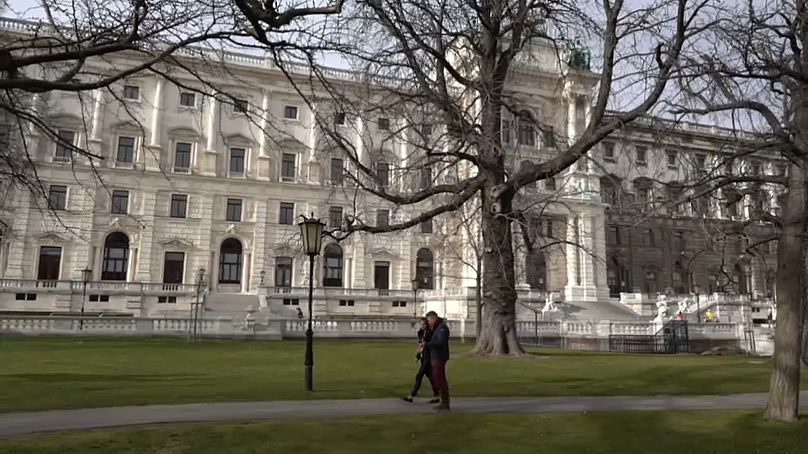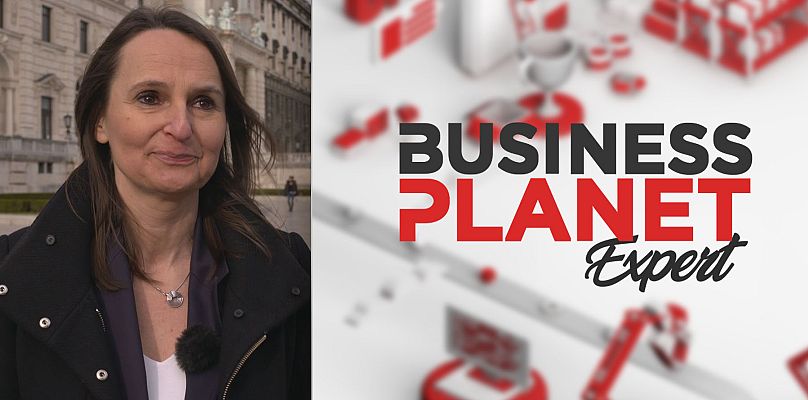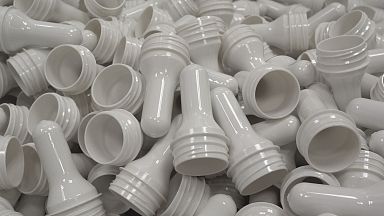Business Planet heads to Austria to see how one big family firm is attempting to turn the problem of plastic pollution from packaging into a sustainable business opportunity.
Business Planet heads to Austria to see how one large family firm is attempting to turn the problem of plastic pollution from packaging into a sustainable business opportunity.
Today's modern economy would not function without plastic, but the waste it generates has created a public backlash because of concerns over its environmental impact. Innovative ways of producing, reusing and recycling plastic are therefore needed if we are to change our relationship with this essential material.
Putting the fantastic back into plastic
ALPLA is a major converter and recycler of plastics. A global leader, the Austrian company is committed to developing innovative sustainable packaging systems. One of its core products is a bottle made from so-called PET, (polyethylene terephthalate) already recycled plastic that can be used again and again.
“The great thing about PET is, that it's easy to recycle and can be used repeatedly in closed loops. Production of this recycled material results in about 90 percent less Co2 emissions. This is an important contribution for climate protection,” explains Christoph Hoffman, ALPLA's Director of Corporate Strategy, Sustainability & Circular Economy.
The firm has teamed up with a number of other businesses, including Nöm, an Austrian dairy company which uses ALPLA’s 100 percent recycled PET (rPET) bottles for its milk products. Unlike many other dairies, which are reintroducing glass bottles, NÖM made the deliberate decision to use plastic.
“It's very simple," explains Erik Hofstädter, Nöm's Director of strategy, marketing and innovation. "Compared to the refillable glass bottle, we save 20 percent Co2 in total and we would need 23 times more trucks to transport the same amount of bottles than with the PET bottle.”
Plastic’s strength, notably its protective qualities and durability, have from an ecological perspective arguably become a weakness. It is for that reason why circular solutions, which enable plastic to be repeatedly recycled, are vital.
“Our vision is to produce the most sustainable packaging. We will continuously strengthen our recycling activities and develop innovations using less material,” says Hoffmann.
What goes around must come around
ALPLA is a signatory to the Circular Plastics Alliance. The initiative supported by the European Commission aims to boost plastic recycling inside the EU to 10 million tonnes by 2025. The alliance covers the full product cycle of plastics and includes around 180 organisations from industry, academia and public authorities.
The Association of the Chemical Industry of Austria (FCIO) is also a signatory to the Circular Plastics Alliance. The FCIO's Director General Sylvia Hofinger argues that believing that we can live without plastic is unthinkable.
"Plastics are indispensable - for climate protection, mobile phones, medical products. That means we need an intelligent solution, so that we can use the advantages of plastics and at the same time prevent them from being released into the environment. A circular economy is precisely this intelligent solution."
As part of its new Green Deal, the European Commission has said it will adopt a Circular Economy Action Plan in the coming months. In addition to scaling up the amount of plastic that is recycled, it will also include policies aimed at reducing and reusing materials even before the recycling stage.
Sylvia Hofinger is the Director General of the Association of the Chemical Industry of Austria (FCIO), a signatory to the Circular Plastics Alliance (CPA). Business Planet spoke to her about the CPA to find out how it is working to boost the amount of plastic being recycled in Europe.
What is the Circular Plastics Alliance exactly?
"The "Circular Plastics Alliance" is an association of now more than 170 players in the European plastics industry who have a vision: to increase recycling and the circular economy in the European Union. The European Commission supports this vision. Now all the players have set themselves the goal of recycling ten million tonnes of plastic in the EU by 2025 and bringing it back into the market."
There is a huge amount of plastic finding its way into the environment, especially our rivers and oceans. Shouldn't we be just using less plastic altogether rather than recycling more?
"You have to look at it in a nuanced way. Of course, plastic has absolutely no place in the environment. On the other hand, plastic has such convincing product properties that it has become the most widely used material. We need plastics in environmental technologies, for climate protection, in medicine, but also for everyday products such as mobile phones. This means that we need an intelligent solution so that we can use the advantages of plastic on the one hand and prevent it from escaping into the environment on the other. Through the circular economy we are creating exactly that: a win-win situation for the people and the environment."
Do you see a future where there will be less concern about plastic as a material?
"I am optimistic about the future. I believe that if we manage to successfully establish a circular economy, we will also convince people again that plastic is a valuable material. Far too valuable to throw away. Let me give you an example. In the case of food packaging, the ecological footprint of food is usually thirty times greater than that of the packaging. So if we save on packaging, we are not doing the environment and the climate any good if more food is spoiled. In other words, we need to return to a fact-based discussion. Then people will certainly realise that plastics have advantages. But one thing is clear: we must ensure that they no longer enter the environment."
Useful facts
In the EU, over 50 million tonnes of plastics are used every year. Over 25 million tonnes of plastic waste are collected every year, but less than a third is recycled.
The Circular Plastics Alliance (CPA) is an initiative facilitated by the European Commission, which aims to boost the EU market for recycled plastics to 10 million tonnes by 2025. The alliance currently includes over 178 organisations representing industry, academia and public authorities.
In addition to the CPA, ALPLA has also made a pledge under the Voluntary Pledges Campaign, an initiative which also seeks to boost the EU market for recycled plastics to 10 million tonnes by 2025. More than 70 companies and business associations have already submitted their voluntary pledges to use or produce more recycled plastics by 2025.
The recently published EU Green Deal highlights the need to mobilise industry to achieve a climate neutral and circular economy focused on resource-intensive sectors such as plastics. In March 2020, the Commission will adopt a Circular Economy Action Plan that will include a sustainable products policy to prioritise reducing and reusing materials before recycling them.













